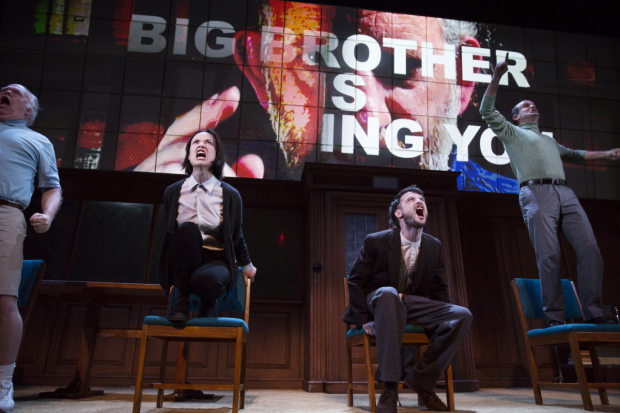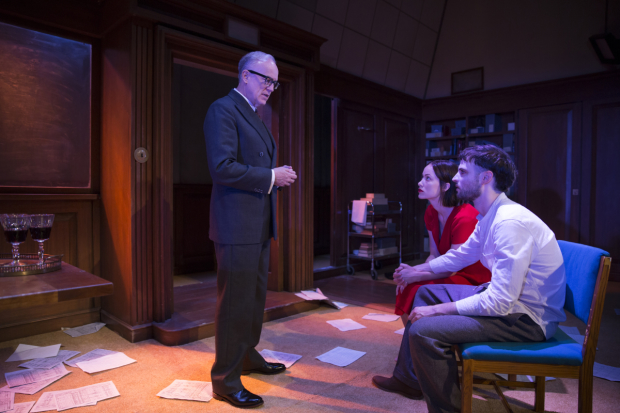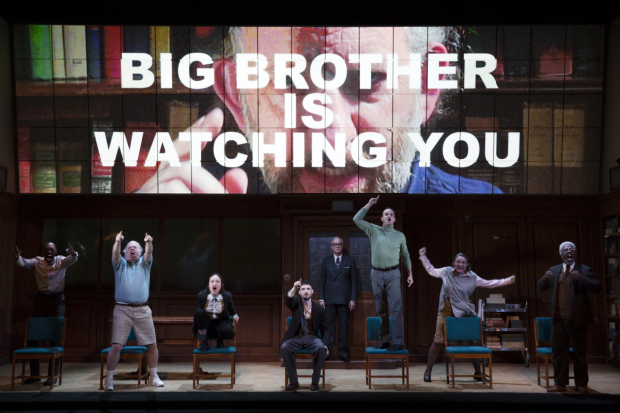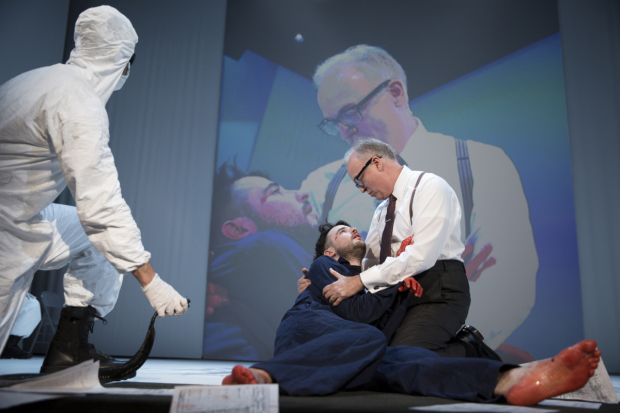
(© Julieta Cervantes)
The year 1984 has come and gone, but George Orwell's novel about a totalitarian future continues to haunt our collective imagination. It jumped to the top of the best seller list following the election of Donald Trump (68 years after its initial publication). The tragic murder of Otto Warmbier by the North Koreans reminds us that brutal regimes like the one Orwell imagines really do exist. And although we in the West enjoy personal liberty far exceeding that of the North Koreans, we cannot help but notice the eerie similarities between our society and Oceania (the mega-state in which the novel is set): the prevalence of screens, the widespread surveillance, the never-ending state of war.
Orwell's prescience comes uncomfortably to the fore in a new stage version of 1984 which has come to Broadway's Hudson Theatre all the way from Airstrip One, where it premiered at Nottingham Playhouse before transferring to London's West End. While it occasionally feels more like a film than a play and suffers from some strange narrative choices, it still captures the essence of Orwell's message in thrillingly theatrical ways.

(© Julieta Cervantes)
Our protagonist is Winston Smith (Tom Sturridge), an outer party member working at the Ministry of Truth in Oceania. Despite his occupation covering up their lies (or perhaps because of it), he has lost faith in the party and its leader, Big Brother. He hates how people disappear into the Ministry of Love (the ironic name for political prison) and everyone pretends like they never existed. He resents how the party attempts to control everything, even thoughts. He wants to bring down Big Brother, but how?
He sees the possibility of a conspiracy with his coworker, the alluring Julia (Olivia Wilde). There's also O'Brien (Reed Birney), an inner party member who might be a member of the Brotherhood, a shadowy resistance outfit led by renegade party founder Emmanuel Goldstein. But even in a place where children are recruited as spies, we're not sure that Winston should trust anyone.
Adapters Robert Icke and Duncan MacMillan convey the general paranoia of the story while shearing some of Orwell's specifics: Gone is any mention of the party's driving ideology, Ingsoc (newspeak for "English socialism"), though Emmanuel Goldstein (played by a disheveled Max Baker) does smack of a contemporary firebrand politician in Tim Reid's lackluster Two Minutes Hate video.

(© Julieta Cervantes)
Icke and MacMillan (who also direct) unveil the exposition in short, often confusing scenes. The inclusion of a book club as a framing device adds to our disorientation. Entire sections are presented via video projected on the set, giving us the sense of a world under constant scrutiny (while also spoiling one of the major reveals in the novel). Despite all of these questionable choices, the resulting play is undeniably riveting — no mean feat considering how large tracts of the book are essentially political essays masquerading as a novel.
Sturridge certainly looks the part of Winston: Pale and emaciated, he sports a terrible bowl haircut (just one of the many indignities foisted upon outer party members like him). Unfortunately, his presence feels a bit lacking in the early scenes, which make us long for the mind-reading skills of the novel's omniscient narrator. Flashes of startling earnestness only occasionally illuminate Winston's dark state of perpetual befuddlement, like when he animatedly confesses to Julia how he thought about smashing her head when he first saw her.
Sturridge comes alive in his scenes with Wilde, who effortlessly exudes Julia's naughtiness. They rut like Anne Rice vampires during their first sexual encounter, spitting on each other and tearing up parts of the set. It's not exactly hot, but it is fun to watch.
We also get a guilty pleasure out of watching Birney, who is just so good at being bad. He is professorial as O'Brien, patiently explaining to Winston how 2+2=5 (if the party says so). The house lights come up during one of these lessons and the event transforms into what feels like a TED talk delivered by Rod Serling.
The final 20 minutes are not for the faint of heart: They include graphic depictions of torture, which Sturridge performs with frightening realness and heartbreaking vulnerability. We cannot help but feel sympathy for this human being in pain, who is being punished for telling the truth.

(© Julieta Cervantes)
Icke and MacMillan come closest to conveying the heart of Orwell's novel through aggressive design: Natasha Chivers regularly blinds the audience with flashes of light, while sound designer Tom Gibbons blasts the theater with sudden noises and unsettling overhead activity. We may retroactively roll our eyes at these horror film tropes, but we flinch just the same, proving that our animal reflexes override our high-minded ideas.
Similarly, Chloe Lamford's funhouse set plays tricks on us, which the directors exploit in their staging. We think characters are in one place, but they're really elsewhere. Surreal scenes play out under the burning lights before we are plunged once again into darkness. We learn to distrust our own eyes, which is, of course, a primary goal of the party.
We walk away from 1984 feeling manipulated — embarrassed in the knowledge that we are just as susceptible as the people of Oceania to such theatrical trickery. In an age when the existence of a shared reality has been called into question and so many of our waking hours are spent watching illusions on screens, Orwell's story feels more relevant than ever.











